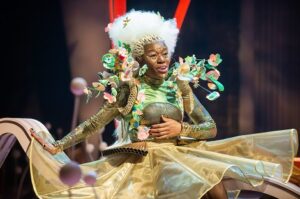Jessica Harris reviews this RSC production.
An exploration of sexual codes and attitudes, Shakespeare’s Much Ado About Nothing has a contemporary feel to it. The RSC develops this further in this futuristic production through a set where angular shapes speak of the post-modern, and through costumes which fuse diverse cultural modes together. We are left in little doubt that we are in today’s world, rather than in a world of times gone by.
Yet at the heart of the play is a story-line which is somewhat problematic to our 21st century eyes. It revolves around the noblewoman Hero who is due to marry, until her betrothed, Claudio, accuses her of not being a virgin. Hero’s modesty and submission, attitudes affirmed by those around her, seem to endorse a patriarchal system which judges women and men by different standards.

The production counters this through presenting an array of feisty women who command much of the action, and who project themselves as equal or more than equal to the male characters. At the forefront of these is Beatrice, cousin and companion to Hero, who relentlessly pits her wits against those of Benedick, until they finally admit their love for each other. In addition, gender-switching of the role of Don Pedro to Don Pedra, and of the role of Dogberry, the bumbling constable, allows the RSC to present women who not only speak their minds with regard to love and sex, but also women who are decision-makers in wider spheres.
And so, whilst the scene in which Hero is accused of infidelity remains difficult, since we see her through the eyes of the men around her, Claudio, her father and others, the abiding impression is one of strong women navigating their own relationship and shaping their own destinies.
The production, as a whole, running at just under three hours, was delivered with an energy level which kept the audience’s attention. Humorous interchanges were prolific, drawn from linguistic puns, malapropisms and verbal skirmishes. Dance and music, cultural fusions drawing on funk, soul, R&B and more was well used.
Performances were somewhat patchy: on occasion they were overly dramatic and we lost the feel of characters interacting with one another. By contrast, Luke Wilson gave a nuanced and sensitive performance as Benedick. Akiya Henry as Beatrice stood out for her energy and stage presence, whilst Ann Ogbomo was a powerful, yet subtle Don Pedra.
But perhaps what put the audience’s engagement with the characters most at risk was the costumes. Elaborate, extraordinary and ever-changing though they were, just sometimes there was just a little too much going on with them – a bit like a desert that has been over-sweetened.
Directed by Roy Alexander Weise, Much Ado About Nothing is at Stratford until 12 March. Further details.
Pics: Ikin Yum © RSC


